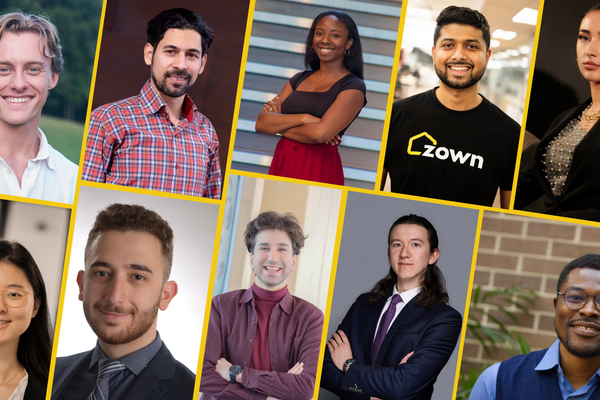
Founder networks and community foster investment-ready startups
Velocity-linked founders reflect on how to elevate their game within the industry

Velocity-linked founders reflect on how to elevate their game within the industry
By Naomi Grosman VelocityEmpowered by a network of peers and advisors, nearly 20 Velocity-linked founders pitched to international investors, pharmaceutical companies and other global med tech stakeholders at the recent Ontario Biosciences Innovation Organization’s Investment Summit in Toronto.

From left to right: Atefeh Zarabadi of AiimSense, Shalini Gupta of Asima Health, Michael Zhou of ProMedAI, and Alison Smith of Roga.
At the summit, Velocity-linked founders showcased technologies that range from fast and accurate saliva-based concussion detection, a patient transfer robotics system, to software that can streamline artificial intelligence-enabled research and development. These tech founders had the opportunity to network with investors and pitch their startup live, armed with the expertise and confidence needed to boost their investment odds in a challenging market.
Sadegh Raeisi (PhD ’14) is the co-founder and CEO of Foqus Technologies, a software company that combines quantum physics and artificial intelligence to make MRI medical imaging faster — from an hour to five minutes — improving care for patients and relieving burdens in the health care system.
 He says getting nuanced advice from other experienced founders. who are aware of the challenges of leading a startup, creates an environment for constructive feedback. The community of health-tech peers at Velocity is unique in the ecosystem.
He says getting nuanced advice from other experienced founders. who are aware of the challenges of leading a startup, creates an environment for constructive feedback. The community of health-tech peers at Velocity is unique in the ecosystem.
“There’s so much to learn from founder to founder, especially having former ones on the director team. That’s a critical part of the startup environment,” Raeisi says.
He adds that it is powerful to be part of a supportive peer community.
“Apart from reaching important business milestones, like securing our first pilot and receiving funding, I’ve received advice about business building that’s not random — it’s from others who are aware of challenges so they can show the best way to go forward,” Raeisi says. “That has prepared me for pitching and networking at an event like this investment summit.”
Shalini Gupta is the founder of Asima Health, a startup that is developing a multi-cancer blood test for cancer remission screening.
She says beyond the knowledge-sharing that prepares her to articulate the company’s value proposition, being plugged into the network of founders at Velocity is unparalleled.
“There’s a lot of advice that goes around but what’s distinctive at Velocity is that those giving advice are founders themselves making it more reliable,” Gupta says, whose career has taken her from India to the U.K. and U.S. before settling in Canada to work on Asima Health full time.
“The advisors are solution oriented, always looking for ways to help and encourage making the company’s vision even bigger. We are plugged into an exceptional community.”
Alison Smith (PhD ’09), co-founder and chief scientist of Roga, a mental health platform and wearable device to decrease stress, underscores the importance of noticing familiar faces while pitching on stage.

Alison Smith (PhD ’09), co-founder and chief scientist of Roga, presenting at the Ontario Biosciences Innovation Organization’s Investment Summit in Toronto.
“Pitching live and seeing so many familiar faces makes me feel so much more relaxed,” Smith says. “Being connected to Velocity, I’m armed with practical knowledge to speak to investors effectively and getting Roga to an investment-ready level.”
Atefeh Zarabadi (PhD ’15), founder of AiimSense, a portable brain scanner developer, says practical support is equally matched by moral support that is also important when preparing to speak to investors with authority.
“[The support] is exceptional, particularly getting feedback from advisors who show so much understanding and took time ahead of this summit to help with the pitch,” Zarabadi says.
She echoes Smith’s sentiment of the power of community when pitching live.
“I feel so much pride in seeing so many amazing founders also from Velocity here at the summit, especially female founders.”

Atefeh Zarabadi (PhD ’15), founder of AiimSense, presenting at the Ontario Biosciences Innovation Organization’s Investment Summit in Toronto.
Read Velocity’s story on how founders helping founders enables them to go further even faster on Waterloo News.
Velocity Health companies are funded in part by the Government of Canada through the Federal Economic Development Agency for Southern Ontario (FedDev Ontario).

Read more
Velocity alumni return to guide the next generation of founders

Read more
Here are the people and events behind some of this year’s most compelling Waterloo stories

Read more
From transforming solutions for homeownership to advancing health care interventions, Waterloo talent continues to disrupt industries and drive change
The University of Waterloo acknowledges that much of our work takes place on the traditional territory of the Neutral, Anishinaabeg, and Haudenosaunee peoples. Our main campus is situated on the Haldimand Tract, the land granted to the Six Nations that includes six miles on each side of the Grand River. Our active work toward reconciliation takes place across our campuses through research, learning, teaching, and community building, and is co-ordinated within the Office of Indigenous Relations.